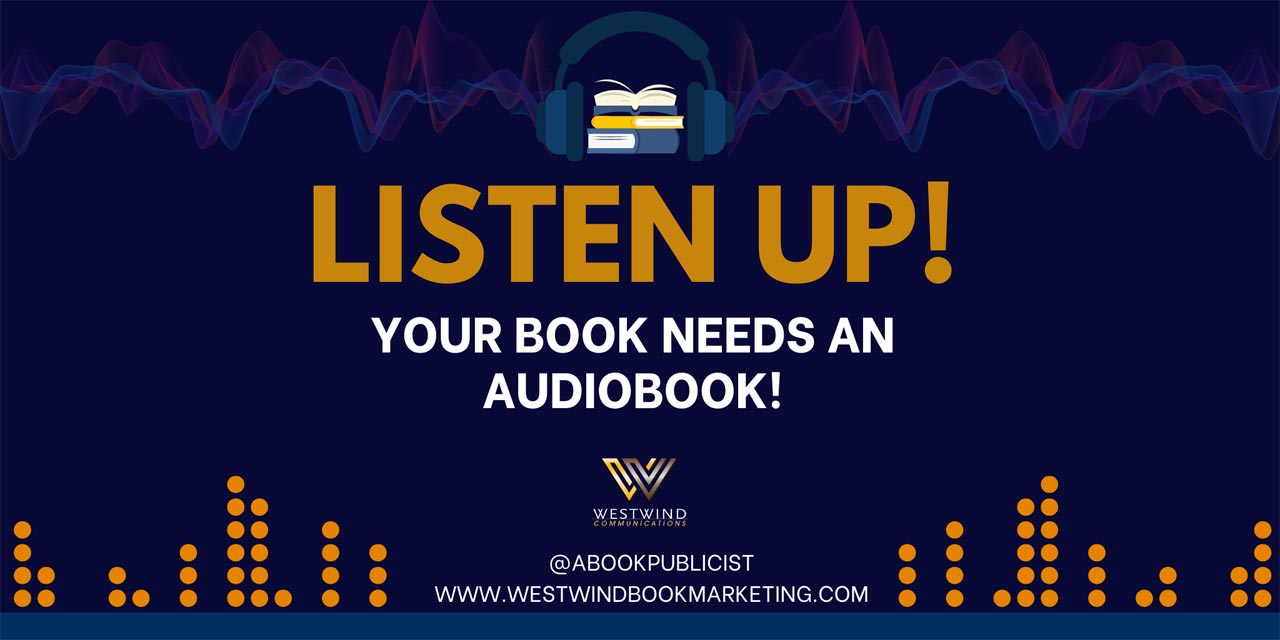
Audiobooks are quickly becoming a popular method of “reading,” with estimated revenue reported at $2.5 billion for 2023 according to Publisher’s Weekly. Busy readers are opting to listen to their favorite books while jogging, driving, and even washing the dishes—usually on their smartphones. Most listeners are under the age of 45, but the numbers are increasing. Now with Spotify entering the market this will no doubt lead to more listeners and more accessibility to millions. As an author with a published book, you need to get in the game.
A lot goes into making an audiobook: you need a narrator, a sound technician, a good place to record, and distribution for the finished product. While hiring your own technician and recording studio can cost a lot, there are other ways— even free ones— to produce your own audiobooks.
Here are your options:
Complete marketplace production: This is probably the easiest and most cost-effective way to produce an audiobook. These marketplaces connect authors with narrators, engineers, recording studios, and others capable of producing a finished audiobook. Currently, the most popular is ACX, but more are popping up.
ACX has a “Royalty Share” option, in which the narrator does the reading with no fees in exchange for a cut of the royalties. It’s no upfront cost to the author and distribution is through top retailers Audible, Amazon and iTunes. The downside is ACX /Audible claims distribution rights to your book for seven years.
Voice actor Thomas Miller, who narrates books for author Frederick Dodson, has a love/hate relationship with ACX/Audible. “You almost need to use them because they control so much of the market,” he says. “But, as both an author and narrator, if you have other pipelines of distribution, you should think long and hard before you lock your book up for Seven. Long. Years.”
Other options are quickly popping up. New York Times best-selling author Colleen Gleason used ACX for the six books in her Heroes of New Vegas series. She was happy with her narrator and found the ACX interface easy to use. But when it came time to make audiobooks for her new Stoker and Holmes series, both she and her narrator switched to Findaway Voices.
Findaway Voices offers the same services as ACX, but upfront costs average $1000-$2000 for a 50K word book, or about $250 per reading hour for the narrator. The royalties are all yours and you aren’t locked into a contract of years, except with their distribution through Audible.
“I had such a good experience with Findaway, and they have such a broad distribution system that I ended up moving all of my six Heroes of New Vegas books to that platform as well,” says Gleason. “Audiobook usage is on the rise and users are increasing in double digits each year; I decided I wanted my books to be available to as many readers/listeners as possible. So for now, I’ll continue to use Findaway Voices for any future audiobooks I do.”
Find your own narrator: Some authors prefer to have celebrities read their books, which can add to the appeal to purchasers. But just because they’re famous, doesn’t mean they are qualified. You need to find out if they have narrated a book before. For every hour of reading, there are several hours of editing work that has to be done, so you want a smooth and qualified reader. “It was learning how to read well that took some time,” says Miller. “That’s where your 10,000 hours comes in. The one thing nobody estimates properly is editing time.”
There are other places where narrators are selling their talent. A thorough Google Search will reveal some sources. An inexpensive, although not necessarily fool-proof place to find narrators is fiverr. Some authors have found narrators through Suchavoice.
Remember, much of an audiobook’s success is tied to the narrator. Before you hire someone, listen to examples of their work, and give them a section of your own book to try. If yours is a work of fiction, pick a part with dialogue so you can see how they voice different characters. If it is nonfiction, be sure they lend the right authority to what you are trying to sell. Also, do you want a male or female narrator? Someone with a solemn voice or a perky one? These are all things to take into consideration.
Narrate your own book: William H. Coles, a prolific author, professor, and musician, has an extensive line of his own books that he narrated himself. “I believe, when possible, the best reading is by the author,” says Coles. “However, I think recording experience is necessary.” Coles has radio experience recording live air segments. He also hired the best sound technician he could find, which he attributes to his success. Coles’ most recent recording is a podcast, “Story in Fiction,” which has already surpassed 1000 downloads.
But self-recording isn’t for the faint of heart or the low-budget author. “There is a lot of time and energy spent, and I wouldn’t suggest any author lightly go through the process,” says Coles. “It’s much easier to hire a company that works with authors and/or hires an actor.”
Also, if an author is going to work alone, he or she will need an expert in distribution to get the audio books out to their market. Most of the marketplaces such as ACX and Findaway Voices have wide distribution. Kobo, Google Play and others have gotten into the audiobook market, and libraries find a large percentage of their borrowers request audiobooks now. Recently, Scribd has partnered with Waze so you can listen to your book in your car while your GPS leads you to your destination. Life has never been better for the voracious reader-on-the-fly.
Overall, making your books into audiobooks seems to be worth the effort and cost.
“The growing use of mobile devices for reading fiction makes it all worthwhile,” says Coles. Most authors would agree. The reach is even to the youngest kids. Alexa, Google Assistant and Siri will now read your books—or your children’s bedtime stories—aloud.
Amazon best-selling author Dan Milstein created an audiobook of his most recent business book Rule #1: Don’t Be #2. “With more readers turning to audiobooks, it’s a wise business investment and a great way to reach more readers who don’t have the time to sit down with a book in their hands,” says Milstein. “It makes sense to do it.”
Audiobooks stand on their own now as a medium. Forbes magazine calls audiobooks “THE publishing industry trend.”
The Bottom Line: Authors – It’s never been easier and more affordable to get an audiobook for your book. I encourage you to explore these options ASAP. Do it now!
#Authors – It’s never been easier and more affordable to get an #audiobook for your #book. I encourage you to explore these options ASAP. Do it now! Click to tweet this article to your friends and followers! 𝕏About Book Publicist Scott Lorenz
Book publicist Scott Lorenz is President of Westwind Communications, a public relations and marketing firm that has a special knack for working with authors to help them get all the publicity they deserve and more. Lorenz works with bestselling authors and self-published authors promoting all types of books, whether it’s their first book or their 15th book. He’s handled publicity for books by CEOs, CIA Officers, Navy SEALS, Homemakers, Fitness Gurus, Doctors, Lawyers and Adventurers. His clients have been featured by Good Morning America, FOX & Friends, CNN, ABC News, New York Times, Nightline, TIME, PBS, LA Times, USA Today, Washington Post, Woman’s World, & Howard Stern to name a few.
Learn more about Westwind Communications’ book marketing approach at https://WestwindBookMarketing.com or contact Lorenz at scottlorenz@westwindcos.com or 734-667-2090 or fill out the form below. Follow Lorenz on Twitter @aBookPublicist. Want help titling a book? Check out Scott Lorenz’s new award winning, bestselling book: Book Title Generator- A Proven System in Naming Your Book www.BookTitleGenerator.net.
Would you like help promoting your book?
If so, tell us a little about your book. What is the title? Do you have a publisher? What is the publish date? How many pages is your book? What is the cost? Do you have web site? What is your specific goal I.E., to make money, raise awareness, get the attention of an agent or publisher, sell the story to a movie or TV studio or something else?
Submit the form below with this information and we’ll get back to you as soon as possible. Thank you!



Love your thoughts on audiobooks. They are gaining in popularity by the year, and it’s an extra income stream for writers. If you want to save $, narrate yourself. Also, if you’re into narrating for others, this is an added income stream for you. Just make sure your recording equipment is pro level.
Audiobooks are used by so many people for many reasons. People who drive to work, truckers on a cross country drive, housekeepers who are
alone in a home or business find the audiobooks like a companion. People who want to maximize their time or do two things at once if they are
at a boring job. The bottom line for authors its a must if you want to reach everyone who can benefit from your book.
I love audiobooks and have been listening to them for many years. This article is excellent as a guideline for anyone considering using this format. I personally think the narrator is so important. I have a specific author I love on Audible but I can’t stand his narration of the first book, luckily Phil Gigante my all-time favourite narrator has narrated the rest of the series. Great pointers, thank you.